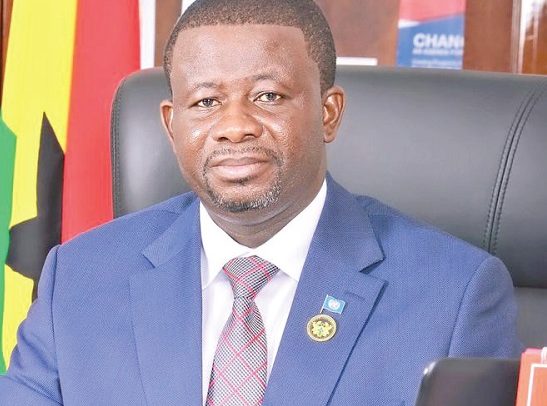Eric Nana Agyemang, the Minority Chief Whip
The longstanding debate over the election of Metropolitan, Municipal and District Chief Executives (MMDCEs) resurfaced in Parliament yesterday, as both Majority and Minority Members of Parliament (MPs) urged the House to chart a clear course toward the implementation of an elective system to improve local governance.
Contributing to a statement made by his colleague of the Ahafo Ano North, Eric Nana Agyemang, the Minority Chief Whip, Frank Annoh-Dompreh, emphasised that the proposal was not intended to create division between MMDCEs and Members of Parliament, but to reform a decades-old system that often breeds unnecessary tension at the local level.
“Nobody is drawing a collision course between MMDCEs and MPs,” he said and continued, “We have practiced decentralisation since the 1980s. Change is inevitable. It is time we take a patriotic position and confront the challenges within our local government structure.”
He cited incidents of violence during MMDCE confirmation processes across the country, arguing that introducing elections could reduce friction and increase accountability.
According to him, while MPs and Assembly Members are elected, MMDCEs are selected by a small group, raising questions about democratic representation.
“Why should only MMDCEs be appointed? We elect everyone else in the process,” Mr. Annoh-Dompreh asked, calling on Parliament to push constitutional amendments that would open the position to public vote.
Other MPs echoed similar sentiments and reminded the House that both major parties – NPP and NDC – had previously agreed in principle to the election of MMDCEs, though the disagreement centred on whether these elections should be held on partisan or nonpartisan lines.
“This issue is long overdue,” Ahafo Ano North MP, Eric Nana Agyemang said, adding, “The current government, with its parliamentary strength and manifesto commitments in both 2020 and 2024, has what it takes to make this happen. We on this side are ready to support them.”
He called for a national roadmap to guide the transition and urged stakeholders to work with the ongoing Constitutional Review Committee to embed this change in the national governance framework.
However, concerns over implementation lingered. Deputy Majority Whip and National Democratic Congress (NDC) MP for Bia East, Richard Acheampong warned that an elected MMDCE who does not share the central government’s vision could frustrate development plans, particularly in light of increased fiscal decentralisation, where 80% of development resources are being pushed to the local level.
“There are fears that a DCE from a different party could refuse to implement the government’s programmes,” he noted and quizzed, “How then does the central government achieve its objectives?”
The debate also brought to light concerns about national security and protocol logistics, with Mr. Acheampong raising hypothetical but plausible issues: “What happens when the President visits a district headed by an opposition-aligned DCE? Even access to accommodation or basic protocol arrangements could become politicised.”
Despite these reservations, MPs across the political divide agreed on the need for reform. They called for constructive engagement to build a framework that balances local democratic participation with national coherence.
“This shouldn’t just end as another round of lamentation. Let’s sustain the conversation and empower the Local Government Committee to follow this through to a logical conclusion,” Mr. Annoh-Dompreh intimated.
Parliamentarians were hopeful that consensus could be reached to finally resolve this governance puzzle, with the Constitutional Review Committee currently at work.
By Ernest Kofi Adu, Parliament House


